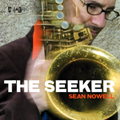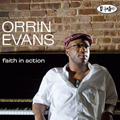www.modernguitars.com

Next Page is the latest release by Israeli-born and New York-based jazz guitarist Yotam Silberstein. The album is a mixture of classic Blue Note-inspired organ trio grooves, Latin and Brazilian rhythms and contemporary jazz harmony that combine to produce an album that is both entertaining and intellectually stimulating. Accompanying Silberstein on the record’s ten tracks are the highly accomplished rhythm section of Sam Yahel on organ and Willie Jones, III on drums. To round out the ensemble, tenor saxophonist Chris Cheek is featured on half of the tracks on the album, adding an extra timbre to the groups classic organ trio sound.
The tunes that Silberstein has chosen for Next Page are a mixture of original compositions and arrangements of jazz and Brazilian standards, including a captivating version of the lesser known Jobim classic “Ligia.” Silberstein’s writing style is a collage that brings together elements of ’60s era organ trio recordings, especially those of George Benson and Kenny Burrell, with a modern Kurt Rosenwinkel-inspired touch flowing through his melody lines and harmonic choices. Silberstein’s writing on tunes such as the opening track “Borsht,” a 5/4 swinger that brings to mind the sounds of a young George Benson playing alongside Lonnie Smith, and the more modern inspired tune “Jalastra,” which floats in and out of the realm of a Rosenwinkel chart, pay homage to these great players while remaining truly original works. There is a fine line that modern composers walk between channeling inspiration from those that have come before them and making an original statement, and Silberstein’s tunes are the perfect balance of both. His ability to draw compositional elements from some of the genre’s great writers and performers, while breathing his own unique harmonic and melodic approach into every melody and chord progression is what makes Next Page stand on its own merit within the catalogue of modern jazz recordings.
Not only is Silberstein a strong writer and arranger, his highly-developed ability as an improviser and accompanist also shines throughout these ten tracks. As an improviser, Silberstein intertwines classic and modern jazz vocabulary, feel and harmonic application in a manner that avoids sounding disjointed or out of place. One of the best examples of Silberstein’s ability to forge the old with the new is during his solo over the Charlie Parker blues “Cheryl,” where the guitarist draws from elements of almost every jazz era from the past 50 years while maintaining his own voice throughout. During the course of Silberstein’s 2:30 solo there are jazz-blues based phrases, hard-bop style lines, chord soloing in both a modern and traditional vernacular and plenty of modern harmony flowing through the guitarist’s lines. While many players invoke these influences in their playing, it is the manner in which Silberstein is able to draw the listener in with a familiar phrase or melody line before leading them into new and uncharted territory that keeps his improvisations sounding fresh and new.
Silberstein’s strong performance is only enhanced by the ensemble of world-class jazz musicians that he has chosen to accompany him on this album. Organist Yahel brings a strong sense of swing and chops to his solos and comping. Though he has the facility to tear up and down the keyboard at will, it is his restraint on tunes such as “Foolin’ Myself” that bring to light his highly developed musical maturity. The tune is taken at a tempo where Yahel could have streamed endless runs of 16th, or even 32nd, notes. Instead, he chooses to focus on developing short melodic phrases that he lays down right in the pocket. This creates a sense that the solo grew out of the tune and was not placed there as an afterthought, an approach that can sometimes be lacking in modern jazz recordings.
The drum duties on the album have been placed in the more than capable hands of the highly adept Willie Jones, III. Jones’ playing is always in the pocket and he possesses the uncanny ability to use a mix of sparse and busy textures while still remaining in full support of the ensemble. Never overbearing, Jones draws upon the full sonic realm of his kit in search of the right groove and timbre for that particular musical moment. Of note is the variety of colors he is able to draw from on the Latin-inspired tune “Ani Eshtagea.” During the tune, Jones lays back on the groove and combines his cymbal and drums in a manner that is never overbearing on the soloists, but that stands out as one of the rhythmic highlights of the album.
Next Page is a strong outing for Silberstein, who was recently honored by being chosen in the top ten finalists of the Thelonious Monk Guitar Competition. Accompanied by a first-rate rhythm section, and a stellar performance by saxophonist Chris Cheek, Silberstein melds elements of the jazz tradition with his own unique perspective on the modern jazz vernacular. The mixture of tradition and innovation, alongside strong ensemble playing and well-written tunes and arrangements, are an invigorating approach to the classic jazz organ trio sound.
Track Listing
1. Borsht
2. Foolin’ Myself
3. Ani Eshtagea
4. Cançáo
5. Blues for 007
6. Weekend in Mizpe
7. If Ever I Would Leave You
8. Jalastra
9. Ligia
10. Cheryl





 Mike DiRubbo
Mike DiRubbo